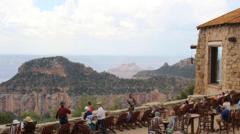In the wake of a tragic militant attack that left 26 dead near the picturesque resort town of Pahalgam, a fragile sense of hope intermingles with fear as tourists begin to return, albeit in limited numbers. The recent violence, characterized as one of the deadliest incursions in years, has cast a long shadow over the previously bustling high street, which had seen a significant decline in visitors following the incident that occurred at Baisaran—a popular meadow just a few kilometers away.
Kashmir's Pahalgam Faces Uncertainty as Tourists Slowly Return After Attack

Kashmir's Pahalgam Faces Uncertainty as Tourists Slowly Return After Attack
Tourism resumes at a cautious pace in Pahalgam after a deadly attack, amid fears for the region's economy and escalating tensions.
The shooting, which targeted mostly tourists, has not only caused a significant loss of life but has heightened tensions between India and Pakistan, both of which lay claim to the disputed region of Kashmir. In the days following the attack, border skirmishes and retaliatory actions between the two nations amplified concerns over regional stability. Residents of Pahalgam—long reliant on tourism—now worry about the long-term effects on their livelihoods, as cancellations from major cities such as Mumbai and Pune reportedly reached staggering rates, with 80-90% of bookings cancelled, according to local tour operators.
Despite the apprehension, some visitors are choosing to remain, motivated by the soaring costs of flights back home. Tourists like Akshay Solanki expressed mixed feelings of panic and determination, opting to explore the area further due to the reassurances from local residents and augmented security measures. Many local business owners, including shawl-seller Rafi Ahmed, are grappling with financial uncertainty—foundations of their livelihoods rocked by the drop in tourism.
Adding to the sensation of community resilience, Bollywood actor Atul Kulkarni publicly encouraged potential visitors not to cancel their trips, emphasizing that the best response to violence is a show of unity by increasing the number of tourists. The path to recovery, however, appears arduous; local leaders predict a slow return to normalcy as ongoing military operations and security fears weigh heavily on the region.
In parallel to the tourism downturn, major infrastructure projects—such as the long-awaited inauguration of the world’s highest single-arch rail bridge—now face delays. Analysts warn that investor confidence may wane amid rising tensions, further jeopardizing economic prospects for Kashmir.
As residents and leaders seek to grapple with the aftermath of the attack, emotional tributes to the victims underscore the human toll of the violence. Jammu and Kashmir chief minister Omar Abdullah poignantly highlighted the pain felt across the nation as he honored those lost, admitting the impossibility of ensuring tourists’ safety amidst such turmoil.
The return of tourism to Pahalgam may hinge on a broader stabilization of both local circumstances and regional tensions, with many hoping that the beauty of Kashmir can once again shine through the darkness of conflict.
Despite the apprehension, some visitors are choosing to remain, motivated by the soaring costs of flights back home. Tourists like Akshay Solanki expressed mixed feelings of panic and determination, opting to explore the area further due to the reassurances from local residents and augmented security measures. Many local business owners, including shawl-seller Rafi Ahmed, are grappling with financial uncertainty—foundations of their livelihoods rocked by the drop in tourism.
Adding to the sensation of community resilience, Bollywood actor Atul Kulkarni publicly encouraged potential visitors not to cancel their trips, emphasizing that the best response to violence is a show of unity by increasing the number of tourists. The path to recovery, however, appears arduous; local leaders predict a slow return to normalcy as ongoing military operations and security fears weigh heavily on the region.
In parallel to the tourism downturn, major infrastructure projects—such as the long-awaited inauguration of the world’s highest single-arch rail bridge—now face delays. Analysts warn that investor confidence may wane amid rising tensions, further jeopardizing economic prospects for Kashmir.
As residents and leaders seek to grapple with the aftermath of the attack, emotional tributes to the victims underscore the human toll of the violence. Jammu and Kashmir chief minister Omar Abdullah poignantly highlighted the pain felt across the nation as he honored those lost, admitting the impossibility of ensuring tourists’ safety amidst such turmoil.
The return of tourism to Pahalgam may hinge on a broader stabilization of both local circumstances and regional tensions, with many hoping that the beauty of Kashmir can once again shine through the darkness of conflict.



















